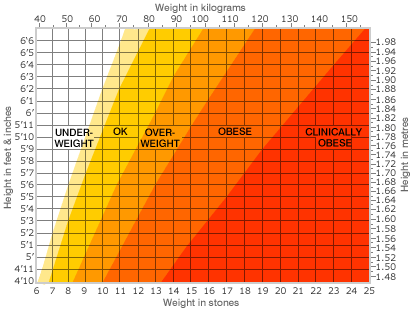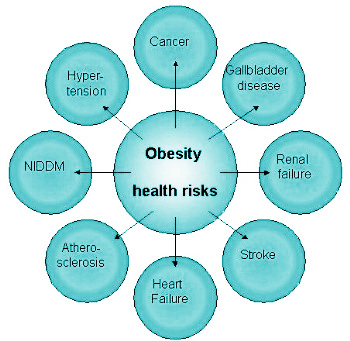*Results may vary by individuals.
Obesity is a medical condition in which excess body fat has accumulated to the extent that it may have an adverse effect on health, leading to reduced life expectancy and/or increased health problems.
Obesity is a major health threat. The extra weight puts added stress on every part of your body and creates many risks to your health.
The chart below classifies BMI and Obesity
Causes of Obesity
Essentially obesity is caused when the number of calories consumed through eating is greater than the calories used in physical activity. The body in the form of fat stores the excess energy.
Morbid obesity is a complex medical disorder, however, and there are a number of other contributing factors.
Genetics can be a key factor in understanding obesity and its causes. It has been proven that the chance of having morbid obesity is increased if other people in your family have the condition.
It has also been suggested that psychological and environmental factors can influence your body weight. Psychological factors influence the way you eat, as well as what you eat. A number of people eat in response to certain emotions such as boredom, sadness, or anger.
Environmental factors could include your lifestyle behaviours, for example the way in which you cook food, the type of job you have and also whether you incorporate exercise within your day-to-day life.
Another significant cause of obesity is an inability to understand what it is to be ‘full’. Most people are aware when they are full through eating because our stomach tells our brain it is full and to stop. However in some individuals there is a flaw in this process. By not identifying when the stomach is full, some individuals continue to consume more food. If they also carry out limited physical activity then this results in weight gain.
Severe and morbid obesity are hugely detrimental to your overall health and wellbeing. As well the risk to general health, it can also lead to premature death.
The health risks of obesity increase with its severity. Although being overweight is relatively harmless, being obese or morbidly obese can cause long term health risks and reduce overall life expectancy. Being obese increases the chance of developing:
COMPLICATIONS OF OBESITY
Diabetes (Type 2 or Non-Insulin Dependant Diabetes Mellitus – NIDDM)
Having a large amount of excess body fat can cause a build up of sugar in your body. This can develop into diabetes, a condition where a person’s body is unable to control their sugar levels. Diabetes is a serious health condition and can increase the risk of kidney failure and blindness.
High blood pressure
High blood pressure is an increased pressure of the blood in the arteries. It is a major factor in heart failure.
Heart attacks
Obese people have a high proportion of body fat, and more fat deposits in arteries to the heart. This increases the chance of having a stroke and heart attack.
Angina
Being overweight contributes to angina which is a chest pain caused by decreased oxygen to the heart. Angina increases the chance of a heart attack and a stroke.
High cholesterol levels
Eating too many saturated fats can raise the levels of ‘bad’ cholesterol in your blood. Too much cholesterol in your blood can damage your blood vessels and lead to heart disease or a stroke.
Other health risks include the development of:
Urinary incontinence
Being overweight increases the pressure on the bladder and surrounding muscles. This weakens them and can allow urine to leak out when you cough or sneeze.
Infertility
Obesity is linked with infertility in both men and women. It has been suggested obesity in women creates hormonal imbalance with disruption to the menstrual cycles. Whereas in men it can result in lower levels of the hormone testosterone, a diminished sex drive and a reduced ability to produce sperm.
Osteoarthritis
The extra weight that is carried on the body puts pressure on the joints, especially the knees, ankles and lower back. This can cause crippling pain even when walking.
Asthma or breathing disorders
Obesity can lead to narrowing of the airway and therefore difficulty in breathing. Such difficulty could restrict normal physical activity such as walking up stairs.
Sleep apnoea
Sleep apnoea is a very serious condition, which can affect you when you are asleep. It is when you stop breathing during sleep, due to the weight of excess fat around the neck.
Cancer
In both males and females, obesity increases the risk of developing cancer of the large intestine and the rectum. In females the risk of cancer of the breast, uterus, cervix and ovary is increased.
As well as the medical problems caused by being obese it can also be hugely detrimental to your level of self-esteem, motivation and body image.




